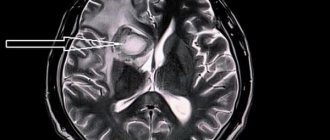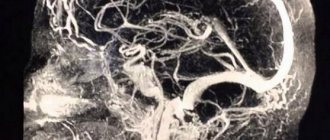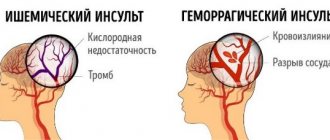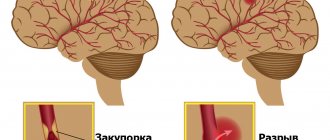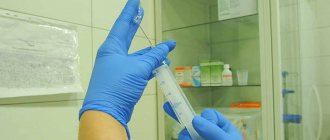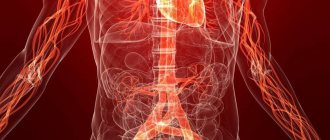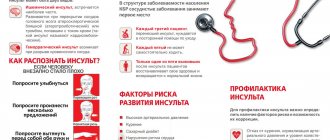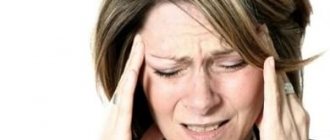The question of whether it is possible to drink alcoholic beverages after a stroke interests many patients. A stroke is an acute disorder of blood circulation in the brain, which is accompanied by pronounced symptoms and causes serious damage to the human brain. The possibility of drinking alcohol during the rehabilitation period can be determined by a neurologist during a consultation. At the Yusupov Hospital you can consult a neurologist and undergo a full examination. Qualified neurologists treat patients, rehabilitation doctors help people restore lost functions after a stroke.
Content:
- Symptoms of alcoholic stroke
- Causes
- Stages of treatment
- Staying in hospital
- Rehabilitation therapy
- Forecasts
Alcoholism causes multiple diseases of internal organs. One of the frequently observed pathologies is impaired cerebral circulation against the background of high blood pressure caused by prolonged alcohol abuse. Alcoholic hemorrhagic stroke occurs after heavy drinking or during a period of alcoholic excess. From the moment the first signs appear, the patient’s condition may improve for some time, but without timely treatment, a sharp deterioration soon follows. Therefore, it is extremely important to recognize the disease in time and literally immediately seek medical help.
Expert opinion on alcohol use after stroke
Cardiologists, together with neurologists and other specialists, fight every day for the health of patients, and I recommend adhering to a healthy lifestyle. In recent years, there has been a decrease in the age of stroke, the reason for this in most cases is the wrong attitude of people towards their own health.
Doctors' opinions regarding alcohol consumption vary. Some experts are of the opinion that drinking alcohol in limited quantities after a stroke is beneficial. Red wine and cognac improve cerebral circulation, which is confirmed by research data. The opposite opinion of neurologists indicates that alcohol in any quantity is harmful to the body, it leads to human degradation. Some doctors consider stroke a hidden consequence of this bad habit.
The neurology clinic employs leading specialists who successfully treat diseases of the nervous system. For each patient at the Yusupov Hospital, an individual therapeutic or rehabilitation complex is developed to achieve maximum effect in treating the disease or eliminating the consequences. Make an appointment with a neurologist at the Yusupov Hospital by phone.
Symptoms of alcoholic stroke
The first signs are lost against the background of withdrawal or intoxication. This condition is called an erased form of alcoholic stroke. Headache, dizziness and nausea do not cause suspicion during this period. But if you suddenly experience severe weakness, increased pain, or vomiting, you should be wary. The manifestations are identical in women and men, at the same time they are accompanied by the following signs of the clinical picture:
- unilateral numbness of the face and limbs;
- vascular cephalgia not controlled by medication;
- lack of coordination, uncertainty of movements, unsteady gait;
- constant weakness and nausea;
- confusion, incoherent slurred speech;
- autonomic disorders - hot flashes, sweating, dry mouth, tachycardia.
The person does not understand and is unable to explain his condition. Loses contact with reality, ceases to navigate in time, makes incomprehensible movements and actions. Sudden mood swings are possible. Such clinical manifestations cannot be ignored.
The severity of stroke symptoms after heavy drinking and the severity of the pathological condition directly depend on the degree and location of the blood flow disturbance, as well as the area of the brain in which it occurred. If at this moment there is no sober person nearby, and those around you are also drunk and cannot provide primary assistance or call a doctor, severe brain disorders develop. Late treatment reduces the positive prognosis and the likelihood of recovery with minimal consequences.
Causes
Long-term consumption of alcoholic beverages causes microdamage to the vascular walls, during the restoration of which connective tissue grows and microaneurysms form, thereby reducing elasticity. Increased blood pressure and increased heart rate cause an increase in the volume of blood passed through. Damaged vessel walls are not able to adequately respond to stretching, so rupture and local hemorrhage occur. The surrounding tissues suffer from hypoxia, and massive death of neurons in the affected area occurs. The formed hematoma puts pressure on neighboring structures, causing even greater damage.
There are two pathological types of acute cerebral circulatory disorders:
- hemorrhagic, occurring as a result of rupture of the vascular wall;
- ischemic, occurring due to blockage of a vessel or severe vasospasm, as a result of which the flow of blood to any part of the brain stops.
The condition is preceded by TIA (transient ischemic attacks) - short-term disturbances in brain nutrition, often the first signs of a stroke after heavy drinking. With prolonged toxic effects of alcohol, the body's compensatory capabilities are reduced. The condition after an alcoholic stroke is much more severe than in patients who did not drink alcohol.
What alcohol will help the body?
When talking about the dangers of alcohol, people often forget that the main cause of stroke is increased intracranial pressure. It's time to forget about this and turn to traditional medicine.
It may not be promoted by doctors, but it remains effective and useful. First you need to figure out what kind of alcohol will be useful?
- Cognac;
- Red wine.
Cognac is the most healthy drink. Only its daily amount should be limited to 50 grams. This is enough to enhance brain activity and equalize pressure, so there will be no consequences.
Red wine is a good stimulant for the heart muscle. It provides irreplaceable support, supplementing the blood with useful substances. Its maximum daily amount should be limited to 150 grams. Only it should be a dry variety, not a semi-sweet one.
If a person purchases alcohol to maintain health, one should not save money. Any surrogate, even in small doses, entails a detrimental effect on the body. It's better to spend a little more money and get real daily help as a result.
Stages of treatment
If signs of a stroke are detected during or after binge drinking, first aid is as follows:
- call an emergency ambulance;
- avoid further drinking of alcohol;
- calm the victim and limit his movements by placing him in bed until the doctors arrive.
To preserve the integrity of the clinical picture, it is prohibited to give any medications, force someone to drink water, or bring a person to his senses by braking or patting the cheeks. The condition of an acute stroke poses a threat to a person’s life and requires immediate medical, sometimes resuscitation, care.
By-effect
Renal and hepatic failure. In this case, immunity decreases, muscle paresis of varying degrees of severity, blood vessels begin to work poorly and the risk of relapse increases.
Mental disorders. The person begins to lose control, stops following the regime, diet, and taking medications. He will begin to become depressed and experience negative emotions. In extreme cases, seeing hallucinations
Epilepsy attacks. It is possible that under the influence of alcohol a person will have an epileptic seizure, which will provoke a new stroke attack.
The possibility of relapse increases to 75% when drinking alcohol in any dosage. Although if the patient feels normal, then you can drink strong drinks strictly according to the prescribed regimen. But the use of ethyl alcohol and the occurrence of stroke are closely related, so it is recommended to completely eliminate alcohol from your life. In this case, the possibility of recovery increases many times, and the person will be able to lead a more productive and long life.
Staying in hospital
A mandatory condition for treating stroke after heavy drinking is complete abstinence from any alcoholic beverages.
Treatment includes emergency prehospital care and inpatient therapy until vital signs, neurological status and hemodynamics are stabilized. Next, a period of rehabilitation is required.
The following groups of drugs are used in the hospital:
- antihypertensive drugs to normalize blood pressure;
- anticoagulants to reduce blood clotting, reduce the risk of formation and dissolution of existing clots;
- medications to normalize neurological status and vascular drugs to improve blood circulation and nutrition of the brain;
- antioxidants to relieve post-ischemic oxidative stress.
Treatment of alcoholic stroke is long-term, the prognosis is individual in each specific case.
Negative effects of alcohol
How ethyl alcohol affects the body and can provoke an attack:
- The vessels become thinner. Gradually, ethyl alcohol makes the vascular walls thinner and rougher. These can easily rupture, which will lead to a stroke.
- The consistency of the blood changes. With alcohol consumption, the blood thickens, viscosity increases, lumps form, and the likelihood of thrombosis and blockage of the vascular walls increases.
- The pressure “jumps”. When drinking alcoholic beverages, blood vessels dilate and blood flows. Then they taper again. If you drink a lot, the blood vessels will dilate even more. Thus, the arterial walls become thinner, and the risk that they may rupture increases several times.
- Atherosclerosis. Alcohol abuse leads to increased blood cholesterol. Plaques form, travel through the bloodstream, and can clog an artery.
- Harm to the heart. Ethyl alcohol is also harmful to the heart muscle. Over time, muscle tissue is replaced by fat. Consequently, blood has difficulty moving through the arteries and blockage can occur.
- Hematopoiesis is disrupted. Alcohol negatively affects all body systems as a whole. Including the process of formation of blood cells and red blood cells.
- The tendency to diabetes increases. If you drink a lot, your risk of developing diabetes is very high. And diabetes is one of the factors in the development of stroke.
If you drink little and infrequently, the risk of developing a stroke from alcohol remains. Therefore, it is recommended to avoid strong drinks completely.
Rehabilitation therapy
After stabilization of the pathological condition and improvement, the patient is prescribed restorative drug treatment, a course of massage and physical therapy, physiotherapeutic procedures, dietary nutrition and adherence to a daily routine. To regain speech, regular classes with a speech therapist-defectologist are necessary.
They use drugs to normalize the functions of the nervous system - Cerebrolysin, Glycine, Piracetam and a complex of vitamins and minerals. If depression and sleep disorders occur, antidepressants are indicated.
Forecasts
Repeated strokes occur 2 times more often in those suffering from alcoholism. The mortality rate is almost 50% of the total number of cases. Disability with complete or partial paralysis occurs in 43 patients out of 100 who have had a stroke due to alcohol consumption.
If there are cases of acute hemorrhagic or ischemic circulatory disorders in the family history of an addicted person, it is worth reconsidering your lifestyle and stopping drinking alcohol forever.
Does alcohol cause illness?
If a person abuses strong drinks, this can provoke a stroke, both hemorrhagic and ischemic. They arise for various reasons, but the result is the same - the destruction of some neurons in the brain.
The ischemic type of stroke develops due to blockage of the blood vessels through which the brain is supplied with blood. If a blood clot forms in a vessel, it blocks the blood flow and oxygen starvation of the brain results. The part of the organ that is not supplied with oxygen atrophies.
The hemorrhagic form develops if a vessel in the brain ruptures, causing bleeding in the brain and some tissues of the organ die
A stroke from alcohol can happen to anyone. The higher the dosage and the more often a person drinks, the more likely he is to have a stroke. Moreover, the age factor does not play a role here. Even if you are under 35 years old, but you drink regularly, this already significantly increases the risk of an attack.
